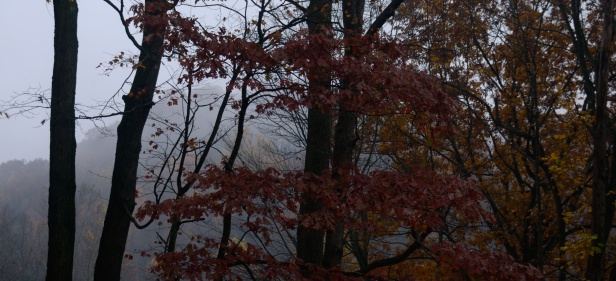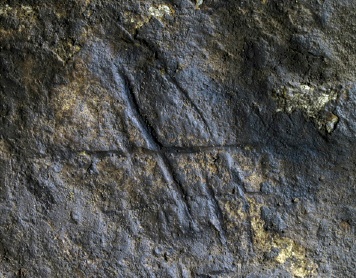 few months ago I came home from work to discover that a large tree had fallen
across my driveway, blocking access to my garage. I have lots of trees, so it was
nothing unusual. But there was an odd thing: about 10 or 20 birds were sitting there,
watching me in that sneaky way that birds do, not looking directly at you but slightly
askew, as if trying to seem nonchalant. I got the distinct impression they had been
waiting to see how I would get my car into the garage. Would I be strong enough to
move the tree? Or would I use one of those strange, noisy human tools? I parked the
car in the driveway and went inside, and they gradually flew away, as if disappointed.
No human tool use to observe today.
few months ago I came home from work to discover that a large tree had fallen
across my driveway, blocking access to my garage. I have lots of trees, so it was
nothing unusual. But there was an odd thing: about 10 or 20 birds were sitting there,
watching me in that sneaky way that birds do, not looking directly at you but slightly
askew, as if trying to seem nonchalant. I got the distinct impression they had been
waiting to see how I would get my car into the garage. Would I be strong enough to
move the tree? Or would I use one of those strange, noisy human tools? I parked the
car in the driveway and went inside, and they gradually flew away, as if disappointed.
No human tool use to observe today.
Another time, while sitting outside reading a book, I started wondering about the calling signals the crows were making. Did the number of caws have any informational content? I made some cawing sounds to test my theory.

Oak trees would have been perfect camouflage for Neanderthals
The crows immediately went silent. Three of them flew over and started nonchalantly watching again. I knew my crow imitations could not have been very convincing, so why were they interested? Angry, perhaps, that a human was appropriating their culture? Or maybe thinking one of their number must be really sick and in distress, maybe even being tortured to have made such a pathetic-sounding call?
Despite the evident curiosity of animals, part of what separates us from the other species is how much effort we expend in purely social interactions. Almost all of our activities, and the problems we face, are social. That's relevant because Neanderthals, our closest relatives, went extinct, the latest theory says, not because the climate turned too cold for them, or because they were too big and couldn't find enough food, or because they weren't intelligent enough, or because the humans brought diseases with them. No, they went extinct because modern humans were too sexy.
The idea is that they disappeared through interbreeding with humans, which is a roundabout way of saying that we humans were just too much for them to resist. When our ancestors showed up, the Neanderthals just all went gaga and dumped their beefy heavy-browed mates to mate with our ancestors, thereby sealing their own fate.

Engraving in Gorham's Cave in Gibraltar, tentatively attributed to Neanderthals. (Source: Rodriguez-Vidal et al., 2014, Proc Natl Acad Sci USA 111, 13301–13306.) Link
It's believed those Neanderthals had reddish hair and light skin, which as I discussed here would be perfect camouflage for an environment like Europe that is rich in oak trees. The Neanderthal Genome Project showed that between 1.5 and 2.1% of the DNA of non-African humans, presumably including hair color, was contributed by Neanderthals—a tremendous amount considering that 50% of our DNA is shared with the banana, 90% with mice, and only 99.5% with each other. This implies that Neanderthals weren't a separate species, but only a subspecies—our big brothers that we tragically lost 30,000 years ago. But if the DNA idea is true, they didn't disappear at all. They became us.
Even though they had superior cranial capacity (up to 1700 cm3, bigger than modern humans, who average around 1400, despite being taller), the Neanderthals were in some ways more animal-like: despite their intelligence they left few cave paintings (the finding of “abstract art” resembling chisel marks found in a Gibraltar cave notwithstanding), and the reports that they placed flowers, shells and other items in each others' graves are no longer given credence.
Where they seem to have differed was in their social interactions. Animals are full-time professionals at being animals. They may be very intelligent, and they are indisputably curious, but their actions are rarely divorced from the task at hand, a trait that is necessary for conceptualizing art and speculating on scientific or religious questions.
Thus it may be that what makes modern humans unique isn't our socialization after all, but our ability to distance ourselves from it. For a species that spends so much time trying to impress each other and clawing our way to the top of the heap, fighting for scraps of social status like dogs fighting over a piece of raw meat, humans are at their best when they experience alienation from each other and from nature.
Only then do we look up at Andromeda or at a cloud and see something worth photographing. Only humans are amateurs at being animals. It is our separation from nature that makes us want to photograph some trees on a foggy autumn morning and post it on the Internet. In our separation from ourselves, we question what others think, and ask where our ideas come from.
Whether we get accurate answers to our questions or not, it is our capacity for alienation that makes us human. Eliminate alienation or jam us together in socialized packs, and you eliminate what makes humans great.
nov 24, 2017, 4:05 am
